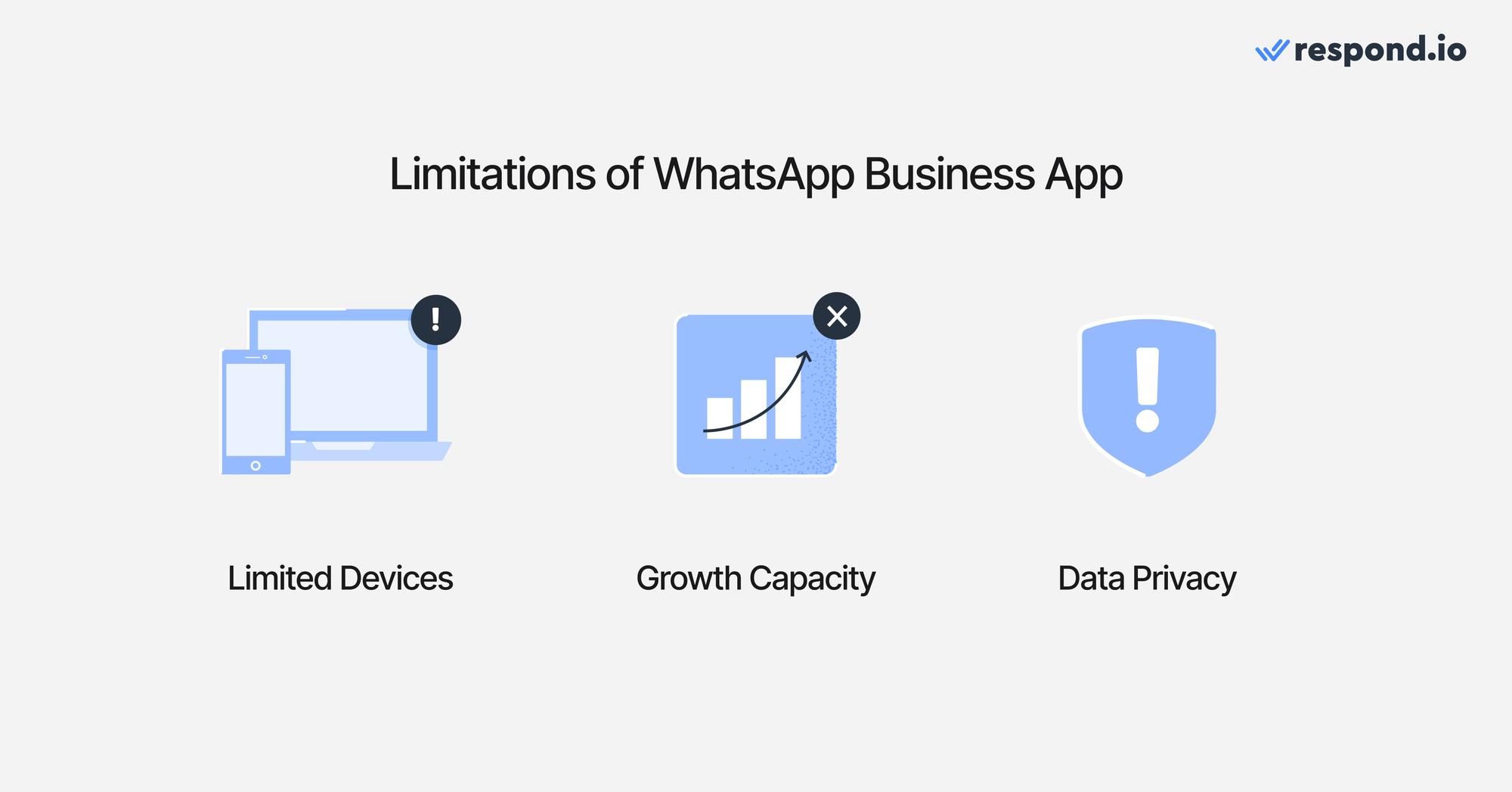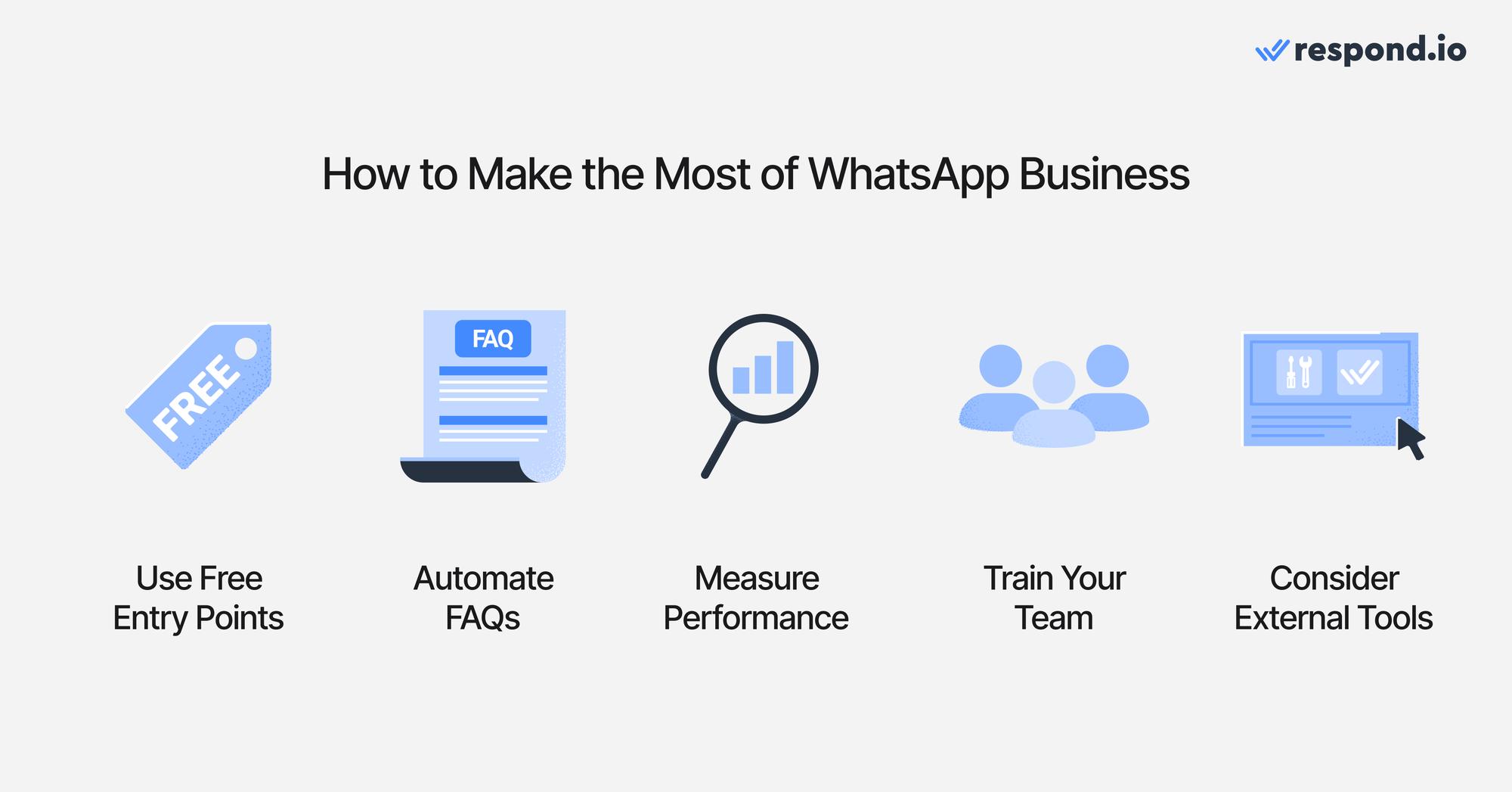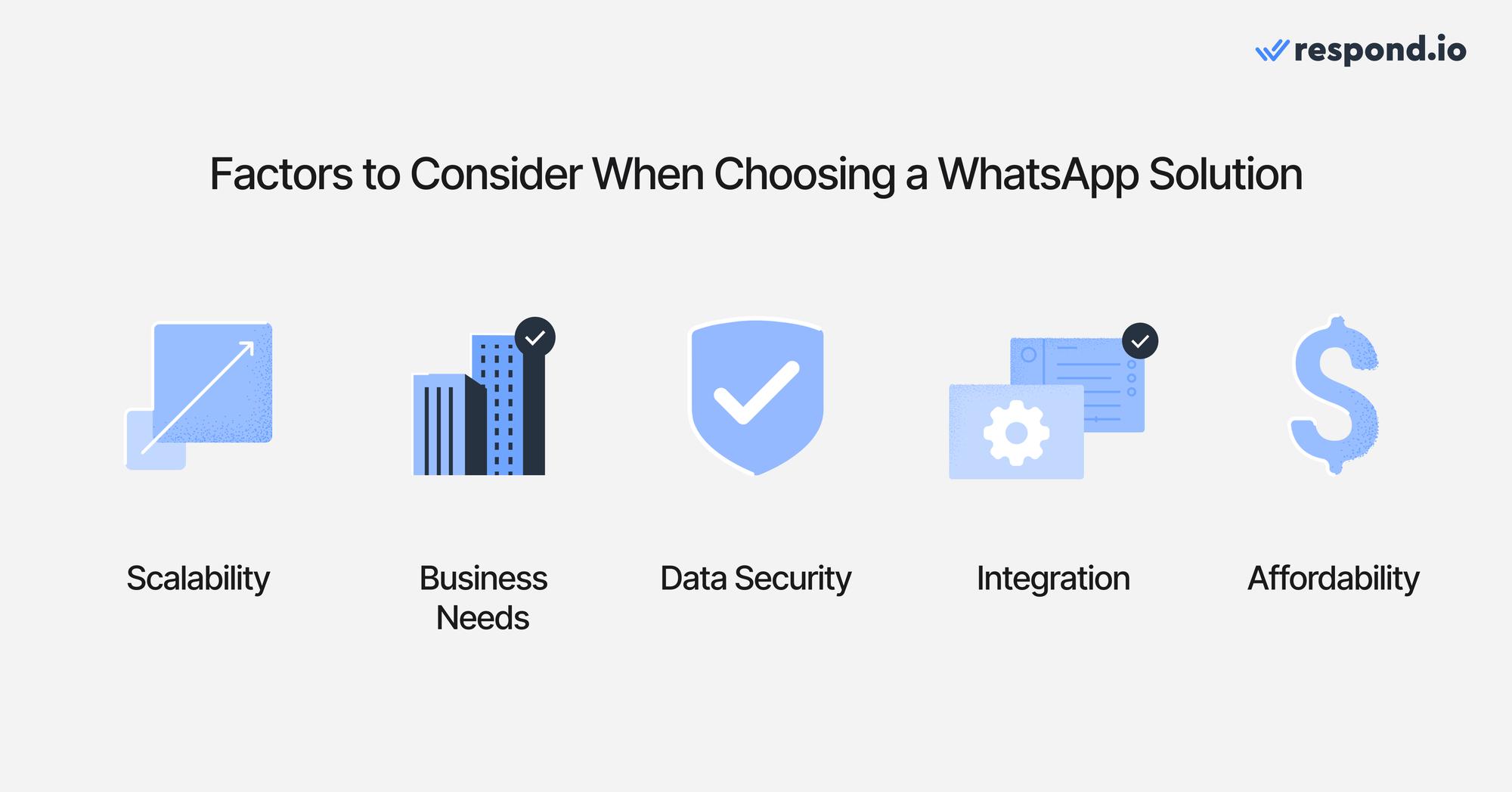

TL;DR
WhatsApp Business comes in three flavors — and choosing the right one depends on your team size, needs and growth plans.
WhatsApp Business App is free and simple, but limited to one device and lacks automation. Great for testing the waters, not for scaling.
Meta Verified adds credibility and more devices, but no integrations or advanced features. Availability is still limited to select countries.
WhatsApp API is the most powerful and flexible option. It supports automation, CRMs, WhatsApp Calling and more — but requires a BSP and comes with setup, subscription and per-message costs.
WhatsApp has changed the messaging game by offering businesses a direct line to leads and customers. But it isn’t a single product. With different tiers—WhatsApp Business App, Meta Verified and WhatsApp Business Platform (API)—understanding the different WhatsApp Business account price options can be tricky.
Below, we’ll break down the ins and outs of all 3, ensuring you understand exactly what you’re paying for and help you find the best solution for your business.
WhatsApp Business App vs Meta Verified vs WhatsApp Business Platform (API)
Before we talk about money matters, we need to understand how all 3 tiers differ from each other broadly.
What is WhatsApp Business App?
The WhatsApp Business App provides a solid starter pack for businesses. It’s free, easy to set up and get going and provides a range of helpful features businesses of all sizes would appreciate:
You can add an address, website and operating hours.
Features include quick replies, automated greetings and away messages.
Use catalogs to display products and services in the app.
That said, its limitations are apparent:
Restricted to a single device.
Lacks automation and scalability.
What is Meta Verified?
Meta Verified builds on the Business App, offering superior functionality for larger teams. It follows a paid subscription model with four available plans.
Business Standard | Business Plus | Business Premium | Business Max | |
Verified badge | ✅ | ✅ | ✅ | ✅ |
Impersonation protection | ✅ | ✅ | ✅ | ✅ |
Protected business accounts | – | – | 10 | 50 |
Meta Verified support | In-app support | Prioritized in-app support | Prioritized in-app support | Prioritized in-app support |
Verified channels | 1 | 3 | 5 | 10 |
Business web page | ✅ | ✅ | ✅ | ✅ |
Linked devices | Up to 4 | Up to 6 | Up to 8 | Up to 10 |
Price (per month) | $14.99 | $44.99 | $119.99 | $349.99 |
Note: This pricing is valid for new subscribers during their first 12 months. After that, your subscription will automatically renew at the standard rate available at that time.
Meta Verified also has some notable limitations.
No advanced automation capabilities.
Doesn’t offer integrations with external tools.
Only accessible in select countries — Meta is quite secretive about
What is WhatsApp Business Platform (API)?
And now for the big leagues. WhatsApp API is ideal for businesses of all sizes, from rapidly scaling startups to large enterprises. Unlike the app-based solutions, WhatsApp API enables you to
Integrate it with a staggering range of customer relationship management (CRM) tools.
Use chatbots and automated workflows to handle FAQs, order tracking and more.
Plus, onboarding is now easier with free, automatically verified virtual phone numbers. Businesses can claim up to two US-based numbers (+1 555) for WhatsApp use, though they can’t receive calls or SMS.
But it’s not perfect and comes with some limitations:
It requires you to work with a Business Solution Provider (BSP) like respond.io to obtain access.
With setup fees, subscription costs and per-message charges, it’s a commitment.
While calling on the WhatsApp Business App is free, it incurs fees through the WhatsApp API.
Check our WhatsApp pricing calculator to estimate messaging and call costs and get your pricing questions solved.
WhatsApp Business Account Pricing: A Breakdown
So we’ve covered the essentials of the 3 different solutions, and now it’s time to talk numbers. Let’s take a look at how pricing differs between the 3:
Solution | Cost | Notes |
WhatsApp Business App | Free to download and use | Indirect costs may include limited scalability and single-device restrictions. |
Meta Verified | Varies by region* | Includes multi-device support (up to 10 devices) and the Meta verified tick. |
WhatsApp Business Platform (API) | - Setup fees: Up to $1,000 (varies by provider). | Contact a Business Solution Provider (BSP), like respond.io, for accurate pricing. |
Cost & Pricing of WhatsApp Business App
Starting with the most straightforwardly priced of the 3, if the allure of a free solution appeals to you, then the WhatsApp Business app is for you. But don’t be fooled by its lack of a price tag; it’s not entirely free of cost.
Specifically, we're talking about its single-device use limitation. This limitation can force your teams to share a single device, making handling inquiries from leads and customers a headache as you scale.
If you're a small business just starting out, this might be a good pick for you. But in the long run, this free solution will start charging you through lost time.
Cost & Pricing of Meta Verified
Meta Verified is a very easy way for WhatsApp Business App users to benefit from some business features like better multiuser access and the Meta Verified tick. However, its biggest hidden cost is its limited availability. If it hasn’t been rolled out in your specific region, you’re essentially stuck waiting for now.
It also doesn’t offer advanced automation and integrations, which may be restrictive once your business decides to implement more complex workflows and connect WhatsApp to customer relationship management (CRM) platforms.
Cost & Pricing of WhatsApp Business Platform (API)
WhatsApp API is where growing businesses of all sizes can take their messaging efforts to the next level. That is assuming you’re willing to invest resources into it. Setting it up for the first time may seem daunting, but WhatsApp BSPs like respond.io can make it an accessible experience.
WhatsApp API setup fees also vary depending on the provider but can creep up to $1,000. Monthly subscription fees start at $50, though they can reach $500 depending on your specific BSP and usage. Then, there’s the pay-per-message model to account for, which charges you depending on your message type and region.
Although the API is clearly the most costly of the 3, if you manage (or want to manage) thousands of conversations daily plus calls, the investment is worthwhile. The API’s ability to integrate with CRMs, perform advanced automation and handle high volumes of messages makes it a must-have for scaling businesses.
Turn conversations into customers with respond.io's official WhatsApp API ✨
Manage WhatsApp calls and chats in one place!
WhatsApp Business App: Hidden Costs
So you now know how the 3 differ in terms of pricing, but wait. That’s not enough information to make a fully informed decision.
There are still hidden costs to note, so let’s examine them, starting with the free option: the WhatsApp Business App.

1. Limited Devices
The WhatsApp Business App is designed for single-device use. While suitable for small businesses, you'll quickly realize it's a bottleneck if you have a team of more than one handling sales and marketing, which can lead to delayed response times and affect your ability to convert and retain customers.
2. Scalability
Handling a growing volume of leads and inquiries can be challenging without advanced capabilities like integrations with CRMs and automation. What happens when a thousand customers decide to message you all at once? You might need to turn to external solutions for WhatsApp sales like SendPulse and respond.io to handle this, which essentially negates the app's free appeal.
3. Data Privacy
For industries like healthcare or finance, where customer data is sensitive and legally protected, the Business App just doesn’t cut it. Without advanced security measures, you’re exposing yourself to potential compliance issues. Tack on fines or reputational damage, and the "free" solution might cost more than you bargained for.
WhatsApp Business Platform (API): Hidden Costs
We’ve established that WhatsApp API is powerful, provided you work a great BSP, but it’s still not without hidden costs.
1. Setup and Add-On Fees
To get started with the API, you’ll likely work with a BSP, and their onboarding fees can reach figures up to $1,000. This usually covers integration into your existing systems and initial setup, but it’s a significant upfront investment. Additionally, some BSPs like Sleekflow charge additional monthly fees per WhatsApp number. Be sure to clarify what’s included to avoid unexpected charges to avoid unwanted surprises.
2. Monthly Subscription Costs
Subscription fees in terms of WhatsApp API price range from $50 to $500, depending on your BSP and the services included. While this gives you access to advanced features, it’s important to evaluate if the added functionality aligns with your budget and, more importantly, existing business needs.
3. Per-Message Charges
WhatsApp now uses a per-message pricing model for businesses on the WhatsApp Business Platform. Businesses are billed for each template message delivered to a user. For example, if you send one marketing template message and one utility template message, you'll be charged twice — once for each template message, based on their category.
Charges only apply when a message is successfully delivered, making the model more fair and cost-efficient. Plus, there’s no charge when responding to a customer with free-form or utility messages within the 24-hour customer service window, which means you can handle customer support without incurring additional costs.
Businesses also benefit from:
A 72-hour free messaging window when customers message you through Click-to-WhatsApp Ads or Facebook Page call-to-action buttons.
Volume-based discounts for utility and authentication messages — the more messages you send, the lower your rate per message.
4. WhatsApp Business Calling API Costs
The WhatsApp Business Calling API lets businesses make and receive voice calls on WhatsApp — and it’s only available through select BSPs like respond.io. Here's what you need to know about the costs.
Inbound & Outbound Calls
Inbound calls (customer-initiated) are completely free.
Outbound calls (business-initiated) require the customer’s consent and are charged only if the call is answered. There are no charges for initiating the call, ringing, or unanswered calls.
Pricing & Billing
Calls are billed per minute and calculated in 6-second increments. Rates depend on:
The country of the person being called
The monthly call volume to that country (more calls = lower rates). Discount tiers reset at the beginning of each month.
24-Hour Messaging Window
When a customer calls you or answers your call, WhatsApp opens a 24-hour Customer Service Window. During this time, you can send free-form messages and utility templates at no cost. Marketing and authentication templates are still billed as usual.
Transparent Pricing with respond.io
Many BSPs add hidden fees or markups, but respond.io does not.You get:
No setup or maintenance fees
No per-call markups
Pricing based entirely on Meta’s official rates
You’ve seen how WhatsApp pricing works behind the scenes. Next, we'll show you how to maximize your budget with WhatsApp Business.
5 Ways to Maximize ROI With WhatsApp Business
Regardless of which WhatsApp tier you select, if you’re going to invest money (or at least time) in the app, you need to make sure every cent and second spent is worth it.

1. Use Free Entry Points Effectively
WhatsApp offers free entry points like QR codes and click-to-chat links that lead straight to your WhatsApp account. Use these to bring in leads without spending extra on paid channels.
2. Automate Responses
Don’t waste time answering the same question a hundred times. Set up automated replies for FAQs or use chatbots to handle common queries. This keeps your team free to focus more on what they do best: handling complex queries and closing deals.
3. Monitor and Analyze Metrics
Data is king. Keep a close eye on metrics like response times, customer satisfaction rates and conversation volumes. Using these insights, you can fine-tune your approach, improve efficiency and ultimately get more bang for your buck on WhatsApp.
4. Train Your Teams
WhatsApp is a tool that is only as good as its users. Train your team to master tone, personalize responses and maintain consistent response times. You can also benefit from teaching them how to utilize WhatsApp’s features, such as quick replies or labels.
5. Leverage External Tools
Sometimes, WhatsApp alone isn’t enough to handle a growing business’s needs. Platforms like respond.io can benefit your WhatsApp messaging efforts by offering integration with CRMs, automated workflows and deep analytics.
How to Pick the Right Solution for Your Business?
Now that you know all you need to know to make an informed decision, one last thing. When deciding on the best solution for your business, you should ask yourself the following before jumping in.

1. Is it scalable for your current and future business needs?
The Business App is a no-cost entry point, but as you scale, its single-device restriction and lack of automation can result in inefficiencies in the long run.
Meta Verified and API options provide solutions for growth but come with incremental costs. Map out your projected customer base and messaging volume to anticipate how expenses will change as you scale.
2. What value are you getting for the price?
Each tier aligns with different business goals. The free Business App is great for testing the waters, while Meta Verified supports small teams with multi-device access.
The API is best for enterprises that need high-volume messaging and advanced integrations. Evaluate each solution's benefits for your workflows and whether the ROI justifies the investment.
3. Do you handle sensitive customer information?
Data security is non-negotiable, and WhatsApp provides strong protections, including end-to-end encryption, to safeguard communications. That said, these alone are usually not enough to achieve full compliance with regulations like GDPR or HIPAA. You’ll need to implement additional measures such as secure hosting, masking and even monitoring.
If your business relies on marketing messages to US customers, note that WhatsApp will pause all marketing template messages to US numbers starting April 2025. Attempting to send one after this date will result in an error.
WhatsApp API technically offers the flexibility needed for industries like finance or healthcare to achieve this, but businesses must take responsibility for managing these safeguards. When adopting the API, consider not just its direct costs but also the potential savings from avoiding data breaches or compliance penalties.
4. Are you looking to integrate WhatsApp with existing tools?
While the WhatsApp Business App and Meta Verified keep the setup simple, the API demands a higher initial outlay for integration with CRMs or custom workflows.
This can include setup fees ranging from hundreds to thousands of dollars. Factor in these costs when planning for API adoption to ensure it fits within your budget for long-term ROI.
5. Do you have the resources to manage a paid solution?
WhatsApp API charges per template message, with rates varying based on region and message type. If your business has high message volumes, these costs can grow quickly.
Analyze your average conversation volume to predict expenses accurately. For instance, you can use respond.io’s WhatsApp Business API Pricing Calculator to help you plan for costs.
New: Use WhatsApp Business App and API at the Same Time
Until recently, businesses had to choose between using the WhatsApp Business App or the WhatsApp API. Now, with WhatsApp Coexistence, you can use both on the same number. This means you can keep your existing WhatsApp Business app number and still connect it to the WhatsApp Business Platform (Cloud API) via respond.io — without losing access to your app or needing a new number.
Why It Matters for Teams
Coexistence gives your team the flexibility to:
Use advanced API features like multiple users, automation, AI routing and CRM integrations via respond.io.
Keep using the WhatsApp Business app for simple 1:1 conversations or business tools like catalogs and quick replies.
Maintain your existing number, customer chat history and app access—even after connecting to the API.
This setup is ideal for growing teams that want the power of the WhatsApp API without sacrificing the convenience of the app they’re accustomed to.
⚠️ Note: Some WhatsApp Business app features like calls, group chats, broadcast lists and disappearing messages won't work on the API side. Also, if you enable coexistence, you’ll temporarily lose the green checkmark (you can reapply after setup).
Turn conversations into customers with respond.io's official WhatsApp API ✨
Manage WhatsApp calls and chats in one place!
FAQ and Troubleshooting
Is there a way to get a free trial of WhatsApp Business Platform?
This depends on the specific BSP so it’s best to check with them directly. That said, respond.io offers a free WhatsApp API demo.
Can anyone access WhatsApp Business Premium?
Not quite. Premium is rolling out regionally. Check your app settings to see if it’s available in your area.
How can I get WhatsApp Business API?
Ideally, you need to work with a BSP like respond.io for setup and access. They’ll handle the technical requirements.
Can businesses switch between the different tiers?
Yes! However, transitioning may involve setup fees or process adjustments.
Are there any policies I should be aware of?
WhatsApp enforces very strict rules on messaging consent and spam. Violations can lead to account suspension. You should read Meta’s guidelines to make sure you’re always on the right side of their rules.
What are the steps to set up a WhatsApp Business account?
It couldn’t be easier! Download the app, register your business number and set up a professional profile.
Can Respond.io help me get access to WhatsApp API?
Respond.io is a certified WhatsApp Business Solution Provider (BSP). This means it can directly provide businesses access to the WhatsApp API. You can learn more here.
Can AI Agents answer business calls?
Yes, AI agents can answer voice calls if you use the right tool. On respond.io, you can configure the AI agent’s voice, add instructions and test the experience before going live. This gives you full control over how calls are handled. Unlike standalone voice bots, respond.io’s AI Voice Agent is fully integrated into a unified inbox, allowing businesses to manage messaging and voice interactions in a seamless thread with every customer, with shared logs and reporting.
How can I use AI Agents to follow up on customer conversations?
If conversations are left hanging pending a customer’s response, you can set your AI Agent to nudge them with a relevant follow-up question. For example, respond.io’s AI Agent goes beyond simple time-based nudges or workflow triggers. It uses conversation history to understand its context and determines when and how to follow up. This understanding helps it avoid contacting customers whose issues are already resolved, and to send personalized, human-like nudges at the right time.
How can I transfer customer calls to another agent?
To transfer a call, you’ll need a business communication or call management platform that supports call forwarding. With it, you can move an ongoing conversation to another agent or phone number without disconnecting the customer. On respond.io, you can transfer calls on WhatsApp Business Calling API and other VoIP channels to your teammates or agents in other departments. Call recordings and transcripts remain intact during a transfer, so customers experience a smooth handoff while agents gain full conversation history for context.






































 Electronics
Electronics Fashion & Apparel
Fashion & Apparel Furniture
Furniture Jewelry and Watches
Jewelry and Watches
 Afterschool Activities
Afterschool Activities Sport & Fitness
Sport & Fitness
 Beauty Center
Beauty Center Dental Clinic
Dental Clinic Medical Clinic
Medical Clinic
 Home Cleaning & Maid Services
Home Cleaning & Maid Services Photography & Videography
Photography & Videography
 Car Dealership
Car Dealership
 Travel Agency & Tour Operator
Travel Agency & Tour Operator




